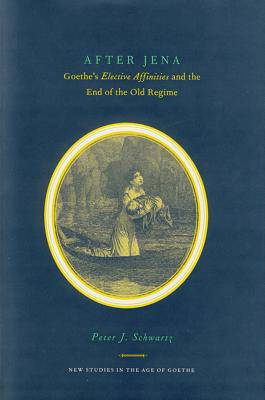
- Afhalen na 1 uur in een winkel met voorraad
- Gratis thuislevering in België vanaf € 30
- Ruim aanbod met 7 miljoen producten
- Afhalen na 1 uur in een winkel met voorraad
- Gratis thuislevering in België vanaf € 30
- Ruim aanbod met 7 miljoen producten
Zoeken
€ 122,95
+ 245 punten
Omschrijving
After Jena is the first scholarly work in English to set Goethe's influential and controversial novel Elective Affinities (Die Wahlverwandtschaften, 1809) squarely within the turbulent time in which it was written. Peter J. Schwartz explores the era of rapid modernization following Prussia's defeat at the battle Jena-Auerstedt (1806)--a battle that permitted Napoleon to extend French hegemony throughout Continental Europe and to dissolve or reform the institutional structures of the German ancient régime. Adducing evidence from many spheres and applying the tools of several disciplines, Schwartz persuasively shows how Elective Affinities reflects post-Jena changes in marriage, property, and inheritance law, and in the political role of the German nobility. He links questions of character, fate, and sacrifice in the novel to modern problems of sovereignty and legitimacy, and investigates how key scenes in the novel comment implicitly on Napoleon, Rousseau, the French Revolution, and the politics and aesthetics of the German Romantics. After Jena reveals the novel's ethical core to be a calculus of political legitimacy, and its aesthetics a means of conciliating tensions provoked by modernity's onrush. It will be of special interest to students of literature, history, philosophy, art, history, and aesthetics.
Specificaties
Betrokkenen
- Auteur(s):
- Uitgeverij:
Inhoud
- Aantal bladzijden:
- 358
- Taal:
- Engels
- Reeks:
Eigenschappen
- Productcode (EAN):
- 9781611483147
- Verschijningsdatum:
- 1/01/2010
- Uitvoering:
- Hardcover
- Formaat:
- Genaaid
- Afmetingen:
- 167 mm x 245 mm
- Gewicht:
- 648 g

Alleen bij Standaard Boekhandel
+ 245 punten op je klantenkaart van Standaard Boekhandel
Beoordelingen
We publiceren alleen reviews die voldoen aan de voorwaarden voor reviews. Bekijk onze voorwaarden voor reviews.











